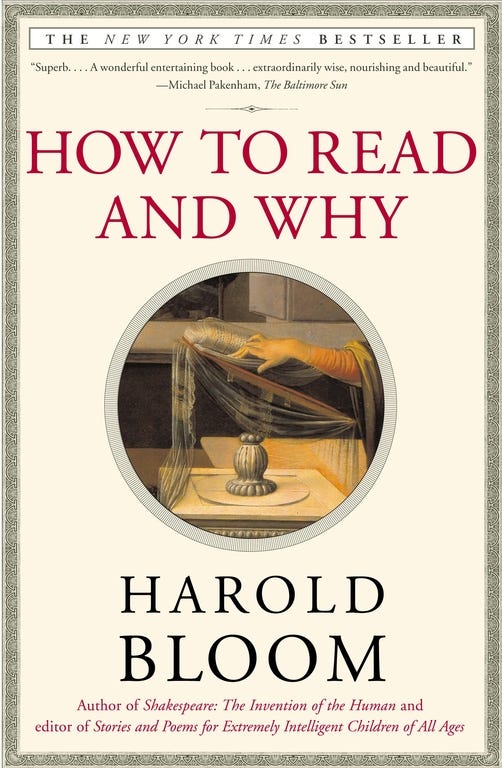Free Your Mind of Cant
In which Harold Bloom, Samuel Johnson, and Uncle Screwtape teach me how (not) to be based.
In his book How to Read and Why, Howard Bloom provides the reader with a few principles for reading well. The first of these he appropriates from Samuel Johnson — "Clear your mind of cant". To be honest, I'm not sure I had ever heard the word "cant" used before reading this book, but it's not every day that as an adult you get to expand your vocabulary, and for that I am grateful.
The New Oxford American Dictionary defines "cant" primarily as "hypocritical and sanctimonious talk typically of a moral, religious, or political nature", and secondarily as "language peculiar to a specified group or profession and regarded with disparagement". For Bloom, this means clearing your mind of academic jargon and priorities in regards to your reading — historicism, critical theories, political readings, etc.
Bloom's first principle for reading may be his most controversial, especially among readers to whom "everything is political", to borrow a common phrase. Bloom is a humanist through and through, who has no patience for puritanical pieties of any sort, whether reactionary or progressive. Human spirits, and their possibility of expansion and connection through the reading of great literature are of the utmost importance to him. To Bloom, they are the most true thing about literature, transcending moral, theoretical, and political concerns.
The question of what is most true really sticks with me. I'm probably more of a moralist in my own reading than Bloom is, and for that I hope I can be forgiven. His second principle is "Do not attempt to improve your neighbor or neighborhood by what or how you read", a principle that I mostly agree with in spirit, one that I think is consonant with the Lord's admonition to "Judge not". But I also believe that great writing can improve us. And while this improvement ought to begin with ourselves, we are not islands — an improvement of a piece is an improvement of the whole. Our own improvements can lead to the improvement of those around us — indeed, I think they almost always will as a function of our increased love for one another. Heck, even by writing here and sharing what I learn I'd be lying if I said I didn't hope to help others with their own "improvement".
And so, I will unabashedly use Bloom's own principle for my own and my reader's improvement, bringing me back to the question of truth. I believe that clearing one's mind of cant is one of the most important things we can do in tending to our own growth. A recent blog by Jake Meador addressing disingenuous reading habits of "Twitter swarms" included the following quote from The Screwtape Letters that reminded me of Bloom's principle:
Your man has been accustomed, ever since he was a boy, to have a dozen incompatible philosophies dancing about together inside his head. He doesn’t think of doctrines as primarily “true” or “false”, but as “academic” or “practical”, “outworn” or “contemporary”, “conventional” or “ruthless”. Jargon, not argument, is your best ally in keeping him from the Church. Don’t waste time trying to make him think that materialism is true! Make him think it is strong, or stark, or courageous—that it is the philosophy of the future. That’s the sort of thing he cares about.
Meador goes on to write:
One of the many threads that link together the post-evangelical left and the Christian nationalist right is a shocking indifference to arguments, ideas, and, ultimately, truth. Both movements are driven chiefly by vibes.
...
Put another way, they operate by convincing their audience not that an idea is true or false, but that it is "based" or "inclusive," "woke" or "abusive."
These labels are all examples of "jargon", or, more notably, "cant".
When I look at those examples too, I see that they are all in a way moralistic; at the very least, they contain some sort of value judgment. "Woke", depending on your interlocutor, carries either connotations of cult-like snobbery, or heightened awareness around social issues. A proposition is "based", as far as I can tell, if its hearers agree with it — they see it as "based" in reality, at least in its original incarnation. It's now gone on to heights (or fallen to depths) of ironic and "meta-ironic" usage.
"Based" is cant that appears concerned with truth, but on close inspection, can belie a subtle indifference, however unwittingly, to transcendent truth. The one who assents to something by calling it "based" may be saying that it coheres with their apprehension of the world as it is, but its common usage in the context of internet hiveminds undermines the pursuit of actual truth. Instead, it turns truth into a servant of whatever cause the loudest chorus champions at that moment.
I already alluded to its (meta-)ironic usage, and I'm fully aware that such usage in often humorously intended — I would be remiss in my own self-awareness if I thought I were above this too. I also fully admit that analyzing very online discourse with the analog tools of the liberal arts may be a sort of category mistake. But much, if not most, discourse in and around our common life occurs online, and the habits of discourse we engage in shape our patterns of thought. Is it any surprise then, that the way we think about what ought to be serious endeavors — faith, politics, economics — are especially marked by tribalism, viciousness, and cant?
Of course, this tendency is not novel, but perennial — Uncle Screwtape has been hard at work well before Twitter, bulletin board systems, or even the DARPA project that created the infrastructure for these things. The web is simply an accelerant for human nature. But if it's an accelerant, then it makes the task of ridding out minds of cant all the more urgent.
The solutions to this problem are myriad — thoughtful reading, exercise, embodied conversation, silence — but they are all relatively strenuous compared to the immediate gratification afforded by the ephemeral platforms that dispense cant like candy. So the next time you grab a snack from a digital vending machine, before you take that first bite, ask, "is this true"?




